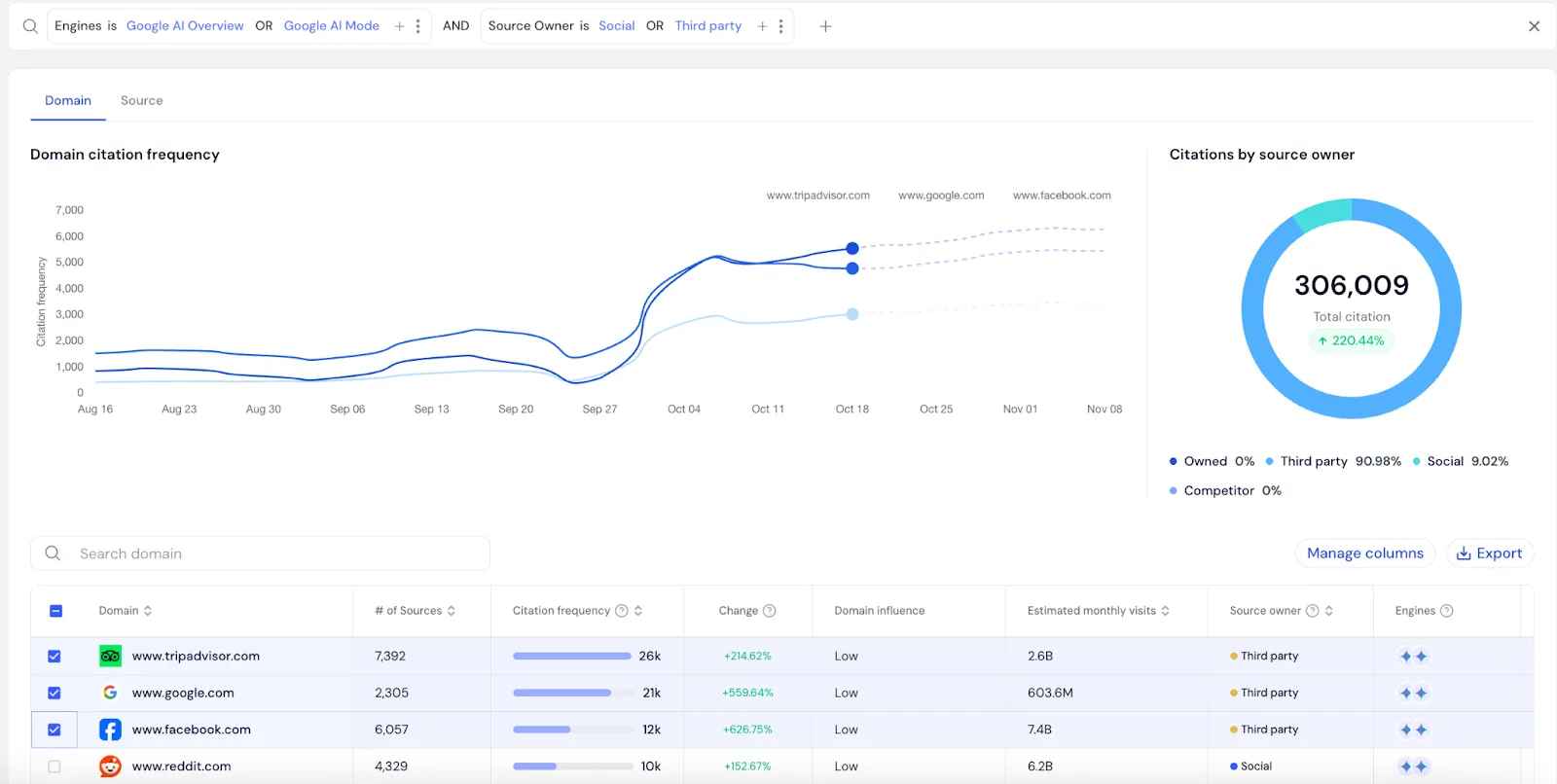For all the noise around the AI arms race, Google is quietly leaning into something no other LLM can match: 25 years of mapping the real world. While others chase model size, Google is doubling down on the "where" layer of the internet - the places, businesses, and physical touchpoints that shape everyday life.
And it's starting to show up in the data.

Google Is Increasing Local Citations - Especially Its Own
When we analyzed brands with physical locations, a clear pattern emerged:
Google is dramatically increasing its geo-related citations inside its AI surfaces, particularly Google Business Profiles (GBPs). They're also pulling in location-heavy sources like Tripadvisor, but the shift toward their owned ecosystem is unmistakable.
In the beauty industry alone, we saw a staggering 6,700% spike in Google Business Profile citations across 500,000 citations - starting in August 2025.
.webp)
Google is effectively self-serving authoritative business data inside its AI experiences. Other LLMs are not doing this.
What Businesses Need to Know
If you operate physical locations, this is your moment of leverage.
As users shift toward AI-powered search and discovery, Google is ensuring its ecosystem remains the most reliable way to connect digital intent to real-world action. That means your presence inside Google Business Profiles, Maps, and related Google entities directly influences how you surface in AI Overviews and AI Mode.
Put simply:
If "in-person" matters to your brand, Google is becoming even more important than traditional SEO ever suggested.
Immediate Actions to Take:
.webp)
- Optimize Your Google Business Profile: Ensure your profile is complete, accurate, and regularly updated. Include high-quality photos, current hours, detailed descriptions, and respond to reviews promptly. This is now your primary AI search asset.
- Maintain Consistency Across Listings: Your NAP (Name, Address, Phone) data should be identical across all platforms. Inconsistencies can hurt your visibility in AI-powered search results.
- Leverage Google's Ecosystem: Take advantage of Google Posts, Q&A features, and booking integrations. The more actively you engage with Google's tools, the more signals you provide for their AI systems.
- Monitor Your Local Citations: Track where your business is being mentioned across the web, particularly on platforms like Tripadvisor that Google's AI is increasingly citing.
- Encourage Customer Reviews: Authentic reviews on your Google Business Profile provide fresh, relevant content that AI systems can use to understand and recommend your business.
Google is building an AI ecosystem that still connects people to places. If you don't control your local data, Google will still surface you - just not the way you want.
AI Search Is Fragmenting - And Not All Models Treat Local the Same
When we isolated ChatGPT data, we found zero usage of Google Business Profiles and recent declines in hyperlocal sources like Tripadvisor. AI-native search engines appear to be leaning away from location-based signals altogether.
.webp)
But Google is doing the opposite.
Across all Google data we analyzed, Tripadvisor citations are increasing, and local sources are appearing more frequently. Since August, Google's push of Business Profiles has accelerated sharply, while ChatGPT and Claude continue to omit them entirely.
The result:
LLMs are diverging in how they treat physical-location data.
Google is building a location-aware AI search engine.
ChatGPT and Claude are not - at least not today.
Google's Sustainable Competitive Advantage
Google's dominance in local AI search stems from decades of investment in mapping, business data, and user behavior patterns. This infrastructure creates a moat that AI-native platforms will struggle to replicate. While ChatGPT and Claude offer impressive conversational capabilities, they lack the granular, real-time location data that makes Google's recommendations actionable for users seeking nearby businesses.
This advantage becomes more pronounced as Google integrates AI more deeply into its core products. Features like AI Overviews and AI Mode are designed to surface local businesses at the moment of intent, leveraging Google's understanding of user location, search history, and preferences.
What This Means for 2025 and Beyond
For brands with brick-and-mortar locations, Google's AI strategy presents a clear advantage:
- Google has the structured local data
- Google controls the world's most used local discovery surfaces
- Google is actively pulling its own business ecosystem into AI answers
- No other LLM is incorporating those signals at scale

Businesses that depend on foot traffic, service areas, or real-world interactions should treat this as a strategic trigger. AI search is changing discovery, and only one major player is grounding that discovery in real-world fidelity.
This shift toward Google-centric AI search isn't temporary - it represents a fundamental realignment of how consumers discover local businesses. Understanding these dynamics will be crucial for brands planning their digital strategies over the next several years.
Google's ecosystem has always been about connecting people to places. Now AI is amplifying that - and how you show up locally will decide how you show up in AI.
.png)
.webp)
.webp)
.webp)